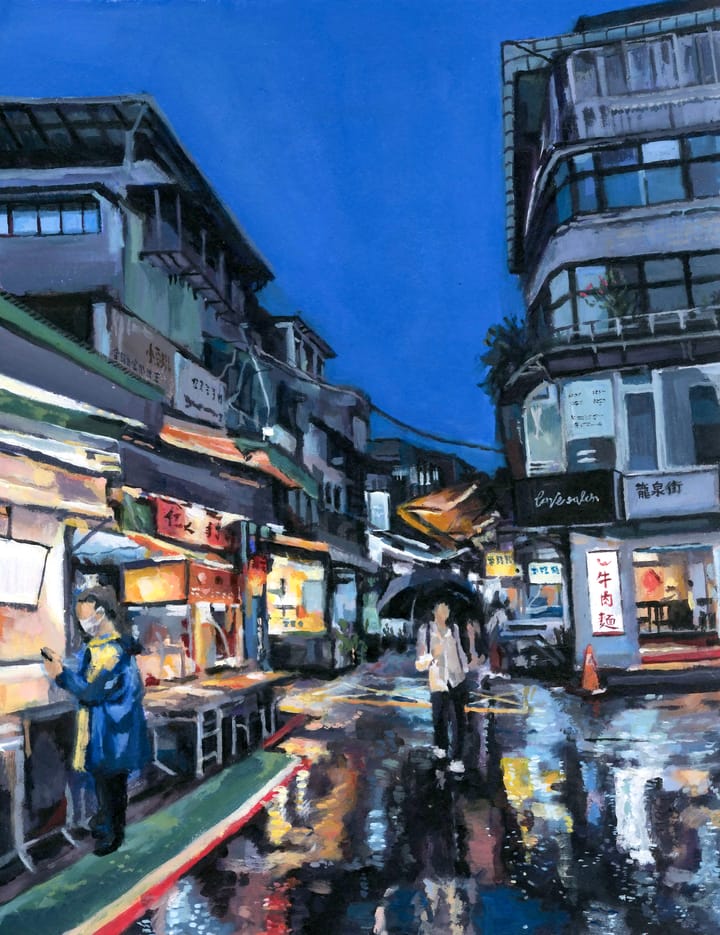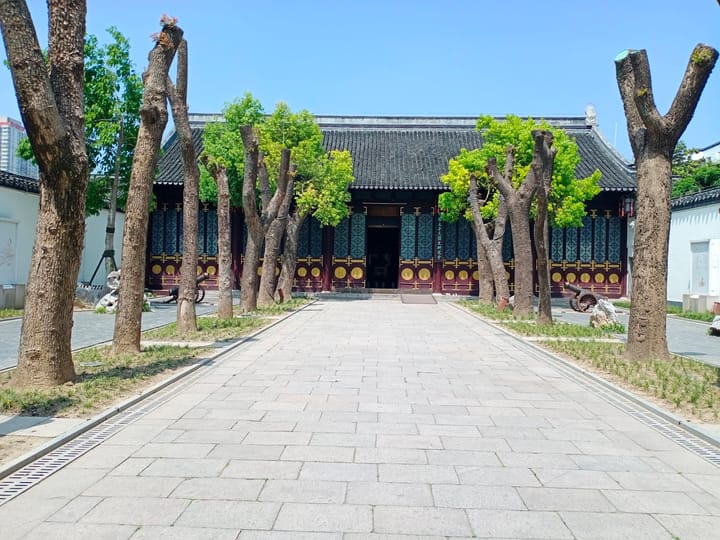#7 Making Sense of a Place That Defies History

It's been a busy month since I was last in your inbox. Taiwan elected a new president, the weather in Taipei finally turned bitterly cold—ok, not that cold—and I made it through my midterm presentation (mostly) unscathed. We also have the Super Bowl in a few days—more on that in a bit.
But first, I wanted to reflect a bit on Taiwan's election and offer some reading recommendations for those looking to understand this mighty island and its unique experiment in democracy.
Taiwan goes to the polls
Last month, Taiwan held a presidential election—the eighth in its short history as a self-governing democracy. As an American, it was hard to be in Taipei and not get caught up in election fever. Despite the bitter rivalry between the main Taiwanese parties—the incumbent Democratic Progressive Party (DPP) and opposition Chinese Nationalist Party (KMT)—the election wrapped up quickly and, in a tradition most Americans must miss dearly, included prompt concession speeches from the losing candidates.[1]
The election was seen by the international press as a victory for the DPP, which secured its third straight presidential term and a clean handoff from incumbent Tsai Ing-wen (蔡英文) to vice president—and now president-elect—Lai Ching-te (賴清德). But the result was a bit more muddled than that. Lai only won just over 40% of the vote. His opponents, the KMT's Hou Yu-ih (侯友宜) and the newly-established Taiwan People's Party's Ko Wen-je (柯文哲) won 33.49% and 26.46% of the vote respectively, adding credence to the notion that the DPP benefited from a fractured electorate and the presence of a popular third-party candidate in Ko.
In the legislature, where the KMT won a narrow majority, the DPP must reckon with a speaker from the opposition party. That's not to mention the mounting challenges it faces from abroad, where China continues to pick off Taiwan's remaining allies while doing its best to isolate the DPP from existing supporters like the United States.
If you're new to the world of Taiwanese politics, this all probably reads as a bit familiar: divided government, angsty electorate, foreign policy issues, etc. But it doesn't take a political scientist to identify the looming issue undergirding all of this: Taiwan's 3.7-million-square-mile neighbor to the west.
China, of course, dominates any conversation about Taiwan's international status. It's because of Chinese pressure that Taiwan only has formal diplomatic relations with 12 countries, many of them Caribbean or South Pacific islands. (And, in an odd historical quirk, Vatican City!)
Taiwanese voters are not solely focused on China—like people anywhere else, they care about jobs, the economy, and other kitchen table issues too—but the DPP's rise is certainly a thorn in China's side. Though the party now eschews talk of formal independence, its roots are in the democratization movement that ended the KMT's decade-long period of authoritarian rule. Lai, who once described himself as a "pragmatic worker for Taiwanese independence," has distanced himself from that view, but to China, it makes no difference. The DPP represents a rejection of the Chinese hope that Taiwan will willingly unite with the mainland.
No matter one's politics, it still remains remarkable that Taiwan endures. Michelle Kuo, one of my favorite writers on Taiwan, put it perfectly in The Guardian:
In a world gone mad, Taiwan’s story is indisputably, heartbreakingly hopeful. According to the nonprofit Freedom House, Taiwan is the sixth most free country in the world – above France and the US. It has legalised same-sex marriage, making it a haven for queer people across Asia. It boasts one of the highest rates of female participation in the legislature. It has universal healthcare and affordable public transport. The DPP holds on to a vision of Taiwan that is genuinely multicultural and multilingual. This is a giant thorn in Beijing’s side, because Taiwan shows that democracy works. One of the Chinese Communist party’s central claims is that democracy is incompatible with Chinese-speaking societies. But Taiwan’s very existence undermines that claim.
So 2024 was a victory for the DPP, but a qualified one at that. If you're looking for to better understand the election and what it means for Taiwan, here are some of the best things I've read/listened to about it:
- On YouTube, Taiwanese media personality Fan Qifei interviewed American scholar Kharis Templeman about the results. (Except for the brief introduction, which is in Mandarin, the rest of the interview is in English.) Templeman's personal website is also a terrific repository of information on Taiwanese politics, from polling data to various government agencies.
- Nathan Batto's election blog, Frozen Garlic, always has a terrific rundown of polling numbers.[2]I especially like his explanation of how the KMT ended up with a legislative plurality. This insight probably escapes most folks who do not follow Taiwanese politics more closely:
The KMT did better in indigenous seats. Taiwan is one of the few countries in the world that over-represents a disadvantaged minority group. About 2.2% of the electorate has indigenous status, but they are guaranteed 5.3% of the total seats. In practical terms, this means that it takes fewer votes to win an indigenous seed than a regular district seat. Indigenous voters have long been a reliable KMT constituency, and the KMT won 4 of those 6 seats this year.
- I thought this New York Times piece by Li Yuan approached the Taiwanese election from a fascinating angle: how do visitors from the mainland feel about it? Her reporting found "envy and tears" among the Chinese visitors to Taiwan, who were struck by the visible symbols of democracy at Taiwan's rowdy political rallies.
Who will win the Super Bowl?
My friends from home found ourselves recently at an impasse: who do we, tortured Philadelphia sports fans that we are, root for in the Super Bowl? The San Francisco 49ers, who have talked endless amounts of trash since we beat them in the NFC Championship Game last year? Or the Kansas City Chiefs, who won the Super Bowl over us on the silliest of penalties, and then proceeded to eke their way back to the Big Game? It's a brutal choice, but to me, not a hard one.
I'll be rooting my lungs out for KC!
Let's break it down:
- The Chiefs might be as inevitable as Thanos. These guys somehow manage to win despite having, at best, one NFL-quality pass catcher (and yes, that's the guy dating Taylor Swift). Their ability to win games behind a terrific defense and an otherwordly talent in quarterback Patrick Mahomes has destroyed my ability to be a hater. I can't do anything but just admire them. They've won me over.
- The Niners might be the most annoying team in recent memory and I say that with some authority given that my own team is regularly Peak Annoying. Despite coasting to the best record in the NFC, this team all but begged to be eliminated in the last two rounds of the playoffs. After nearly blowing a game to a Green Bay team with as much playoff experience as me, they were down 24-7 to Detroit at halftime in the NFC Championship Game before executing another remarkable comeback. To you, these may be battle-tested warriors, hungry to validate the leadership of their quarterback: former sixth-round pick Brock Purdy, once "Mr. Irrelevant," now one of the NFL's most reliable signal callers. To you, they may be the Goliath with just enough David in them to oust the Chiefs. To me, the Niners are insufferable. They (and their Kendall Roy-looking coach) complain incessantly. Their practices sound like something out of 1984. And, of course, they made my team look like fools. I need these guys to lose big time.
Now, the only thing left is to see if Taylor Swift shows up!
In Chinese, the Nationalist party is known as the 國民黨, which was traditionally romanized as "Kuomintang," or KMT. A better transliteration, more in line with contemporary romanization standards, is "Guomindang," but most people still use the abbreviation "KMT." ↩︎
"Frozen garlic" is a popular catchphrase at Taiwanese political rallies because in Taiwanese Hokkien, the phrase "dongsuan" (or "frozen garlic") sounds like the Mandarin words 當選 (dāng xuǎn, or "to get elected"). ↩︎


